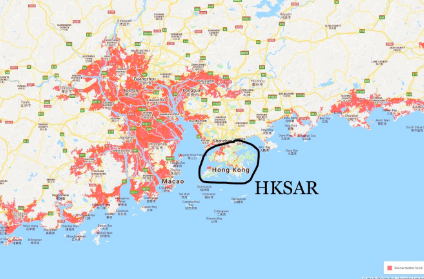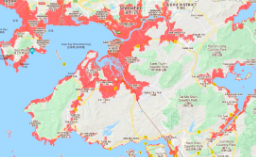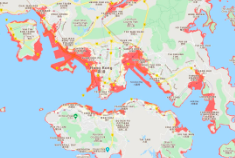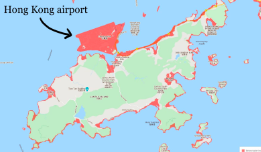The biggest threat to a sustainable future
By Ennan Qiu
Left to right: Deputy Chairman of the Hong Kong Jockey Club Anthony Chow, former Chief Executive Carrie Lam, UNSDSN Director Jeffrey Sachs, and President of CUHK Rocky Tuan, at the launch ceremony of the Sustainable Development Solutions Network Hong Kong. Photo: CUHK Communications and Public Relations Office
Hong Kong – Asia’s World City with a modern cityscape and beautiful countryside. It is a world leader in environmental protection and was given an outstanding mark of C for its highly ambitious climate policies. The government has attempted to foster a cleaner environment through nature conversation, energy efficiency, air quality, water quality enhancement, and waste management.
The 17 Sustainable Development Goals (SDGs), also known as the Global Goals, were adopted in 2015 by world leaders at a momentous UN summit. They aim to tackle the biggest issues humanity faces, including poverty, world hunger, and climate change. The goals came to be in 2016 and called on all countries, rich or poor, to nurture prosperity whilst protecting the planet. However, progress has been unstable and some goals are now further from reach than they were five years ago when they were set.
The United Nations recognised in 2020 that “the 17 Sustainable Development Goals demand nothing short of a transformation of the financial, economic and political systems that govern our societies today to guarantee the human rights of all”. Despite this, it appears that neither the Hong Kong government nor the public is prepared to take the transformational action necessary to achieve the SDGs we so widely commend.
Take, for example, reducing animal products …
Foods such as meat, milk, eggs, cheese and honey just decades ago were luxuries, but they are now staples, consumed daily by most of us. Unfortunately, their production is sucking up the world’s resources, driving climate change, deforestation, biodiversity loss, and even causing a global health crisis. Hong Kong’s high consumption of them is a large contributor to the irreversible ruin we are causing to the Earth’s climate, rainforests and marine ecosystems.
Hong Kong as an idealistic and globally-minded city, with a government “fully committed to sustainable development,” as the Chief Executive, Carrie Lam, said in her speech at the Launch Ceremony of the Sustainable Development Solutions Network. One would be certain that its citizens would not be staunch supporters of any industry that kills over 200 million animals per day, is responsible for 14.5 per cent of global greenhouse gas emissions, wastes enough food to end world hunger, and certainly not one which is leading the destruction of Earth’s largest rainforest!
There are five extremely important Sustainable Development Goals which are being neglected in Hong Kong, including Climate Action, Good Health and Well-Being, and Zero Hunger, which are all related to the issue with animal products.
In early August last year, the UN climate panel released its most thorough assessment of climate change yet. Its findings were thunderous.
‘The alarm bells are deafening, and the evidence is irrefutable: greenhouse gas emissions are choking our planet and putting billions of people at immediate risk’ - UN Secretary-General António Guterres
Changes across the whole world are being observed, some of which, such as rising sea levels, are already irreversible. Climate projections are rapidly moving forward: the Earth is now forecast to reach the treacherous Paris Agreement limit of 1.5 degrees of warming in just 12 years, by which time the current children of generation Z will not have lived even half their lives.
Experts say that sea levels rising will, at its current rate, inevitably reach 6.1 metres, a cataclysmic consequence to say the least.
Here is what that would mean for Hong Kong, red showing the land that will become submerged.
Maps by Climate Central
The United Nations says that global carbon emissions must fall by 50 per cent by 2030 to avoid a climate catastrophe. Despite the deafening alarm bells scientists are ringing, and the fact that Hong Kong is a place with one of the world’s highest per-person emissions, our government only plans to cut carbon emissions by 26 to 36 per cent by 2030.
In 2018, the UN Environment Programme published an article that labelled meat as the world’s most urgent problem, adding that the Paris Agreement objectives will be out of reach unless there is a massive decrease in the scale of animal farming. The article stated that “the use of animals for food is the biggest environmental problem. Forget about power plants, that’s not even close.” However, Hong Kong’s already weak climate action plan has no mention of tackling lavish overconsumption of animal products, which is the main culprit of the high carbon footprint.
According to a study by HKU, Hong Kong’s greenhouse gas emissions would fall by 43 per cent if citizens just reduced their meat consumption until they were in line with the government’s health guidelines.
Interestingly, the Hong Kong government’s Sustainable Development page fails to touch upon the colossal destruction being unleashed by intensive animal farming, merely recommending that citizens ‘contribute to sustainability by reducing energy consumption, using less water, and reducing waste’. Why has there been so much noise on “energy saving and waste reduction,” but complete silence when it comes to tackling the biggest cause of Hong Kong’s high carbon footprint?
It is nothing short of a betrayal to the international community and the future of our planet.
Goal 3: Good Health and Well-Being
Bacteria are getting stronger, becoming resistant to antibiotics because of their overuse. That, according to England’s former chief medical officer, is as big a threat as climate change. It could disarm modern medicine and lead to the rise of rapidly-spreading superbugs far worse than COVID-19.
To put this in perspective, this lesser-known global emergency is also fuelled by animal farming, with nearly three-quarters of global antibiotic use being on animals raised for food. The production of animal products is a threat to the health of everyone, endangering you, me and the people we love.
Image credit: NBC News
‘Eating less meat is a simple way to reduce the pressure on global resources and help ensure that everyone has enough to eat. To say it simply, eating less meat helps fight hunger’. - Oxfam America
At a time when nearly 10 per cent of the world doesn’t have enough to eat, we selfishly feed over a third of all the crops we grow to the billions of animals we keep as livestock. Yet only a fraction of this food energy ends up in the meat we eat -- the rest is spent on keeping the animals alive. This wastes enough food from crops that could otherwise sustain 3.5 billion people: enough to end world hunger five times over. The world has a surplus of food, but a disgraceful famine of solidarity.
Check out the BBC Climate Change Food Calculator!
Goal 12: Responsible Consumption and Production and Goal 15: Life on Land
These two goals aimed to achieve the sustainable management of natural resources, halt deforestation by 2020 and substantially increase global reforestation.
We have failed all of those targets miserably. In the span of just one year, deforestation in the Brazilian Amazon surged by 22 per cent to its highest level since 2006. 80 per cent of this carnage originates from farmers razing and burning forests to make space for cattle being raised for animal products. The vast majority of the Earth’s farmland is used for livestock, but animal-based foods provide less than a quarter of the calories we eat. Instead of feeding the world, farming animals is fueling deforestation, wasting land, food, water, and emitting tonnes of carbon.
‘The livestock sector emerges as one of the most significant contributors to the most serious environmental problems, at every scale from local to global.’ - United Nations Food and Agriculture Organisation
Crammed into tiny spaces, chickens’ muscles atrophy as they develop agonising bone disorders. Image credit: Andrew Skowron
To add fire to the flame, there’s another awful side of animal farming: factory farming. Factory farms are huge industrial buildings housing thousands of livestock, which put efficiency and profits over the basic needs of animals and look nothing like the stereotypical farm pictured on milk cartons. 200 million animals -- over 27 times the population of Hong Kong -- are slaughtered in factory farms every single day.
These operations are a stain on humanity. Crammed into tiny spaces, chickens’ muscles atrophy as they develop agonising bone disorders. As for pigs, being an intelligent creature smarter than dogs and even 3-year-olds, they are raised in massive windowless sheds and trapped in pens too small to turn around in, where they give birth to litter after litter of piglets until the day their throats are slit.
Pigs are crammed into tiny crates where they languish in their own filth. Image credit: Andrew Skowron
Cows are forced to have babies continuously so they keep producing milk, but their calves are taken away immediately they are birthed. To fatten them up before slaughter, they are crammed into tiny feedlots, so they don’t waste energy on moving around.
To take US factory farms as an example, 95 per cent of egg-laying hens in the US live in metal cages, where their average living space is smaller than an A4 sheet of paper. To stop them from attacking each other, their beaks are clamped off without any pain relievers. As these chickens haven’t been genetically manipulated for meat production, workers watch over eggs when they hatch, and when male chicks, commercially worthless and unable to lay eggs, are discovered, they are thrown straight into a grinder.
Image credit: Andrew Skowron
Factory farms also use gruesome slaughter methods to dispatch commercially worthless animals, such as by roasting pigs alive.
Change starts with you and me
Far from being a luxury health craze, sustainable, plant-rich eating is cheaper, healthier and better for the environment than the typical diet!
Evaluate Your Plate is also an insightful tool which allows you to gauge the environmental impacts of different dishes.
In the last few years, plant-based meats have flooded the market. There are many brands to choose from, even in Hong Kong. You’ll be surprised how meaty these products taste! Beyond and Impossible sell burgers, sausages, and ground beef, all of which are available at most Hong Kong supermarkets. OmniPork makes luncheon meat, but also ready-made meals which you can sometimes find at 7-Eleven, including crystal dumplings, buns, sticky rice, stir-fried noodles, and siu mai; these usually cost under $30! Plus, even Café De Coral – a fast food chain – have recently launched a healthy and affordable new OmniPork Claypot Rice dish.
Instead of simply feeling sad and worried about climate change and factory farming, please do your part and choose to eat plant-based, even if it’s for just one meal a day, or one day a week. You don’t have to go vegan: a little bit of action is better than none. By choosing to eat sustainably every now and then, you will already be making a difference!
I understand that you might feel daunted by the idea of changing your long-established lifestyle where meat indisputably plays a very significant role. It supplied essential nutrition for our ancestors, and it provides delicious meals with family and friends.
It’s understandable to want to pretend this injustice doesn’t exist, and continue on with our meat-fuelled diets. However, that is not how we, as a community, built the progressive society in which we live today. That is not how we overthrew the idea that a woman’s role was to give birth to child after child, or ended slavery and passed the Civil Rights Act of 1964. That is not how we abolished the racist system of apartheid in South Africa, or brought 161 Nazi war criminals to justice, created the United Nations, and adopted the Universal Declaration of Human Rights. It is not how we are expanding our use of clean energy to tackle carbon emissions.
And so I ask you: why must we maintain a system of exploitation and torment at a time when we can not only survive but thrive without doing so?
Why do we feel such contempt for people who abuse dogs, but refuse to try plant-based milks to save baby cows?
Only through challenging conventions have we achieved the standard of living we very much enjoy in the present, and only by caring for the victims we will never see or hear can we hope for a truly equitable, prosperous and moral future in which humanity’s potential is completely harnessed.
Let’s opt out of animal products whenever possible, and strive for a healthy, prosperous, and sustainable future for all.
‘Diets that rely less on meat and more on fruit and vegetables could save up to 8 million lives... reduce greenhouse gas emissions by two thirds, and… avoid climate-related damages of $1.5 trillion’ - University of Oxford
For delicious meal ideas and easy plant-based recipes, check out the Facebook group Cheap Vegan Food, #easyveganrecipes on Instagram, or go to Pinterest for inspiration! Happy Cow is also a really helpful website/app that lets you find restaurants with vegan or vegetarian choices around Hong Kong.










